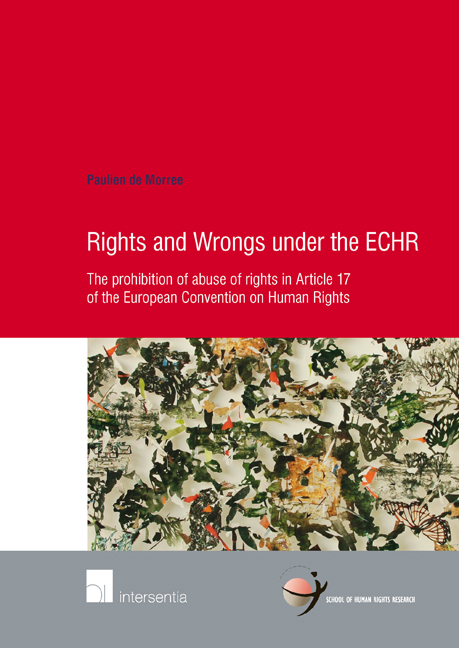 Rights and Wrongs under the ECHR
Rights and Wrongs under the ECHR Book contents
- Frontmatter
- Acknowledgements
- Contents
- List of Abbreviations
- Chapter 1 Introduction
- Chapter 2 The Creation of the European Convention on Human Rights
- Chapter 3 The Strasbourg Case Law on Article 17 ECHR
- Chapter 4 The Interpretation of Article 17 Echr in Legal Doctrine
- Chapter 5 Other Abuse Clauses in Human Rights Law
- Chapter 6 The Concept of Abuse of Rights
- Chapter 7 The Concept of Militant Democracy
- Chapter 8 The German ‘Wehrhafte Demokratie’
- Chapter 9 Militant Democracy in the Context of the ECHR
- Chapter 10 Conclusions
- Bibliography
- Table of Cases
- Samenvatting
- Curriculum Vitae
- School of Human Rights Research Series
Chapter 6 - The Concept of Abuse of Rights
Published online by Cambridge University Press: 12 December 2017
- Frontmatter
- Acknowledgements
- Contents
- List of Abbreviations
- Chapter 1 Introduction
- Chapter 2 The Creation of the European Convention on Human Rights
- Chapter 3 The Strasbourg Case Law on Article 17 ECHR
- Chapter 4 The Interpretation of Article 17 Echr in Legal Doctrine
- Chapter 5 Other Abuse Clauses in Human Rights Law
- Chapter 6 The Concept of Abuse of Rights
- Chapter 7 The Concept of Militant Democracy
- Chapter 8 The German ‘Wehrhafte Demokratie’
- Chapter 9 Militant Democracy in the Context of the ECHR
- Chapter 10 Conclusions
- Bibliography
- Table of Cases
- Samenvatting
- Curriculum Vitae
- School of Human Rights Research Series
Summary
INTRODUCTION
In the previous chapter we have looked at the notion of abuse of rights in the context of human rights law. Yet, the prohibition of abuse of rights as a legal concept is found in multiple legal disciplines. It refers to the exercise of a subjective right that prima facie appears to be in conformity with that right, but that upon close examination turns out to be contrary to the aim of that right and therefore abusive. The concept basically aims to ‘to correct the application of a rule of law on the basis of standards such as good faith, fairness, and justice if, despite formal observance of the conditions of the rule, the objective of that rule has not been achieved’. Originally developed in the area of private law in continental European jurisdictions, the prohibition of abuse of rights has increasingly been accepted in other areas of law as well, including public international law and EU law, and has given rise to a rather large amount of academic publications. In the context of international human rights law, however, the doctrine on abuse of rights only recently started to receive attention. Even though the concept of abuse of rights is sometimes briefly mentioned in the legal doctrine on Article 17 ECHR, potential parallels between the interpretations of the concept in different legal areas have never been seriously explored. Yet, a study of the interpretation of the concept of abuse of rights in a different context may reveal insights that help to better understand the prohibition of abuse of rights in Article 17 ECHR.
This chapter will first focus on the concept of the prohibition of abuse of rights as it was developed in civil law systems. Continental European jurisdictions have a long tradition when it comes to prohibiting abuses of rights in the context of private law. While primarily focussing on issues of property law, over time the prohibition of abuse of rights expanded into other fields of private law – including contract law, company law, family law and procedural law – and into practically all civil law jurisdictions ‘to the point of becoming a widely accepted principle of the civil law’. This chapter will analyse the historical background and the development of the concept of abuse of rights in the context of two dominant civil law traditions: France and Germany.
- Type
- Chapter
- Information
- Rights and Wrongs under the ECHRThe prohibition of abuse of rights in Article 17 of the European Convention on Human Rights, pp. 121 - 146Publisher: IntersentiaPrint publication year: 2016


